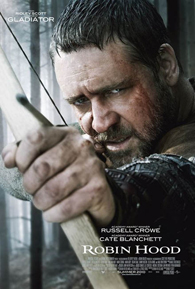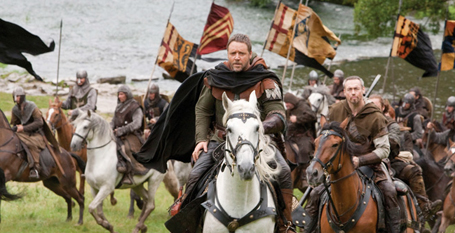
So, if you’re Ridley Scott and you want to do an origin story of Robin Hood (sort of a “Robin before he was Robin Hood”), it makes good sense to throw in the Magna Carta and several big speeches (and a pre-credits intertitle or two) about the tyranny of kings and the natural rights of men – and to turn our hero into the son of the man who drafted an early version of the document.
In Ridley Scott’s origin story, Robin Longstride (Russel Crowe) and his compatriots are returning soldiers from the crusader army of King Richard I. In a revisionist twist to the Robin Hood mythos, Richard I is killed in his return from the crusades (maybe there will now be two things that you could do to fail Mediaeval English History!), Robin gets to impersonate the heir to the Baron of Nottingham (an aristocratic Max von Sydow), woo the late heir’s wife (Cate Blanchett) in a romcom sub-plot, all while beating back a traitor (Mark Strong, following up his Sherlock Holmes stint as yet another comic book villain) intent on causing a rebellion against the new king to aid the invasion of Prince Philip of France.
You may like the romcom parts of Robin Hood far more than I liked the actual Crow-Scott romcom, A Good Year. Russell Crowe, Cate Blanchett, and Max von Sydow do get along well as a comic act. Ridley Scott directs his battle scenes to convey an atmosphere of all-out violence and brutality without taxing the blood pouches – and these are the best bits of the film. The only flaws in Robin Hood are its anachronistic liberal speeches which make it feel like the sequel to The Kingdom of Heaven.
PS: Do stay back for the post-credits sequence, which is as mesmerising and artistic as any Pixar animation’s.












 Printable Version
Printable Version










Reader's Comments
I agree with GYMGUY_mel, it is quite a lame review, the writer is a bit too self indulgent.
However so, I will watch. Always a fan of Russel Crowe and Ridley Scott since Gliadiator.
The only bit I see with any direct reference to history lessons is in paragraph 1. I don't know why people are making a big deal about it. The rest of this review touches on how the director probably came to derive his idea out of making a movie from a legend, and how he tells the story in his own style.
Long-winded review? Not really. This is short, if you compare it with movie reviews in magazines like Rolling Stone, or the occasional ST review.
Please log in to use this feature.